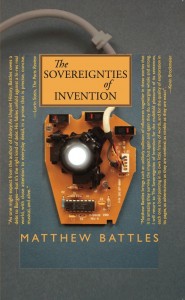11 Favorite Small Press Reads of 2012
2012 was a great year for reading, the best in recent memory and lot of the great books I read came from small presses. Eleven stood out, even among a great group of books. I won’t say these are the best because that is an arbitrary, fleeting designation. These books are my favorites–ones I keep going back to because of a story or a poem or a turn of phrase that has lingered. These books are examples of beautiful writing that does more than appear on the page.
The Sovereignties of Invention by Matthew Battles
Seven Parrots
The Parrot series, published by Insert Blanc Press, was much like its imprint started in a mess of pleasant confusion—my understanding is Insert was at first largely a fake press, that slowly became real—in that prior to the actual writing of each Parrot chapbook, they were simply descriptions of (fake) books by (real) authors to include in the entire fiction that is Insert Blanc; however, after a time, the authors of the (fake) descriptions of the Parrot books were asked to actually write them. What the real story is exactly I’m not particularly concerned. I received seven of the Parrot chapbooks—8-14—and for the past few weeks I’ve carried them around in my backpack, taking one out at random when a moment presented itself for a brief dose of whimsy and entertainment, and what follows will be my perceptions of each of them commingled with anything else I have inside my head upon reading.
Also, I’d like to note as an aside the mere pleasure of a well-made chapbook brought along with your other essentials day-to-day. These Parrots are very well-made, pleasing to look at, to hold, to flip through or to sit down mulling over as seriously as your favorite paperbacks. They call to mind not the muddled shelf of desperate/overwhelmingly-similar zines at any record store on the planet, but a sturdy, comfortable nook in a café where people actually give a shit about reading and are curious about the potentialities of language. Anyway, I digress, but really, I like these books a whole lot.
PARROT 8 ‘I Fell in Love With a Monster Truck by Amanda Ackerman’
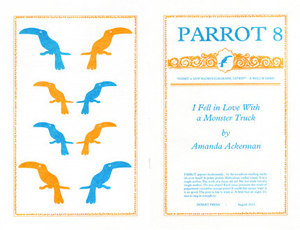
As I was reading this, I began seeing a hunched decrepit figure in the periphery of my right eye, and it was terrifying so I stuck to the narrative at hand and by the time I was done the figure was gone, so that was good. I don’t want to use the phrase “prose poem” for as long as I live—quotations aside, I guess—so I’m not going to do that here but that’s kind of what this one is. These are chapbooks of poetry, in so many words, but this one reads like a brief Beckettian memoir of a young person who’s constantly being given workout advice at very inopportune moments and cannot fit through doors and constantly refers—as a Bartleby, of sorts—back to the phrase ‘I WILL NOT PROFIT FROM THE SUFFERING OF OTHERS’—and as a person on a couch reading this I realized that the title mattered in an indirect way but the guts and the language of the thing were compelling and confusing and intriguing and I kept reading—I like to think at the pace of the author while writing it, altogether manic and piling atop itself in fits of hilarity—and by the time it was done I knew I’d read a portrait of some life somewhere and that was good, too. Also, the Keith Haring-esque drawings throughout complimented the work better than most drawings throughout poems/stories tend to do; which is to say, they often don’t (do not) and perhaps only work 23% of the time…
December 17th, 2012 / 12:00 pm
Luna Miguel, now in English translation
The great Spanish poet Luna Miguel has a bilingual, Spanish/English-translation book coming out from Scrambler Books, entitled Bluebird and Other Tattoos. It ships December 22nd. Here is my blurb for it:
Luna Miguel is a poet who can make me cry. Her passion for life and for poetry is uncommon. She makes language concise, supple, and exciting again. Recurring images: of birds, disease, spit, and blood, integral to a mortal, embodied poetry that reminds us ‘Death cannot be experienced neither for the living nor the dead but for the sick.’ Luna writes a poem, ‘The Beautiful World Gives Me Disgust.’ She writes, ‘I exist, therefore, / then I tremble.’ She writes of the suicidal poets, she writes of all women, she writes of the young. She writes knowing it’s a lie, she lives in the shadow of death. Luna writes of her ‘unprotected life,’ her ‘unprotected diary.’ There is no comfort in this poetry, there is hard beauty. ‘The wind was this. Being born was this. Dying without dying and without a disease was this. To tell you the truth: I am here and I need you.’ Luna.
Mira Gonzalez has a book coming out
Mira Gonzalez‘s first book, i will never be beautiful enough to make us beautiful together, is now available for pre-order from Sorry House, a new press founded by Spencer Madsen. It will be published in January. The trailer above is by Meggie Green and Michael Inscoe.
It’s a book of poems. I’ve read the manuscript and enjoyed it. The poems are declarative, metaphorical, full of imagination and dreams as well as physical events. They create a feeling of rudderlessness, an uncanny mixture of confusion, sadness, and detached introspection.
Click here to read a poem by her on her tumblr and see one of her collages, which I also like. Also there’s these poems and this one.
As an added bonus, Mira is a real fun, nice person to interact with, and her Twitter is very enjoyable and funny and zany.
Sorry House has rounded up an impressive group of blurbs from Blake Butler, Melissa Broder, Brad Listi, Tao Lin, and Victor “Kool A.D.” Vazquez.
I feel nice that Mira will have a book out in January and I’m glad Spencer is making a press according to his particular tastes and collaborating with lots of good people.
An Interview With John Tottenham
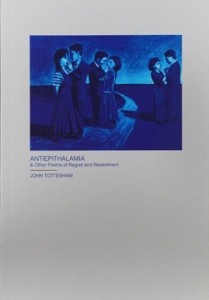 I met John Tottenham at a party hosted in an arcade in March 2012. He approached my friend and asked for a beer from the case she was carrying under her arm. “Let me have one of those,” he said in his British accent. She looked over to me, rolled her eyes and begrudgingly handed him one. “Yes, thanks,” he muttered, pivoting quickly to wander away.
I met John Tottenham at a party hosted in an arcade in March 2012. He approached my friend and asked for a beer from the case she was carrying under her arm. “Let me have one of those,” he said in his British accent. She looked over to me, rolled her eyes and begrudgingly handed him one. “Yes, thanks,” he muttered, pivoting quickly to wander away.
“What an asshole,” my friend mumbled.
I later saw him standing in a dark corner, alone, his eyes half-drawn, leaning on a pinball machine. He looked absolutely miserable. I laughed to myself. His display soothed my own misery. I had been looking for a way home since I arrived.
Six months later, John’s second collection of poetry – Antiepithalamia: And Other Poems of Regret & Resentment – was released on my press, Penny-Ante Editions.
I spoke with John via email.
***
Rebekah Weikel: Your work seems to be embraced by people who don’t normally read poetry.
John Tottenham: Which automatically dooms it to obscurity. All poetry, of course, is automatically doomed to obscurity, but to produce work that is accessible is to make it inaccessible to critics. It leaves them with nothing to do. And the critic has pulled off the outrageous feat of raising himself to the level of the artist and somehow making himself indispensable. But if there’s a direct line between poet and reader, then the critic becomes irrelevant, it could drive them out of business. Clarity is also anathema to people who are steeped in critical theory. The waters must be muddied to make them appear deeper, to give the serious readers and theoreticians something to fish for. Critical theory is a lot of fun but that’s all it is, fun: precisely what it’s supposed to not be. It’s a game for the overeducated. Nobody’s going to go there for wisdom, guidance, solace.
RW: You often write in the first person, but there’s also a contradictory quality.
JT: That’s due to the thorny issue of the unreliable narrator in poetry. It’s something one can get away with in prose – which, for example, Nabokov and Iris Murdoch do very well. But it’s difficult with poetry. People automatically assume that if you’re writing in the first person, you’re being confessional, especially if you’re addressing matters of the heart. I never sit down with the intention of writing a poem about anything or anybody in particular. The way I work is more like surgery or sculpture – a long process of accumulating notes, then chipping away, taking apart, piecing back together.
Tangible Values
Is there anything journalists love writing about more than the death of the publishing industry? Every few weeks there is a new surge of articles and essays pointing at the sky, suggesting said sky is falling, even though nothing ever seems to reach the ground. Magazines are going all digital, they say! Print is dying! Print must be dying so we cannot look for fallibility anywhere else. In recent weeks, there has been a lot of talk about the merger between Penguin and Random House. Two massive publishers will become even more massive.
Today, The New York Times, published yet another article, predicated on the assumption that publishing is declining. As I’ve asked here before, has any industry functioned in decline as long as publishing? Medical doctors should be studying publishing because, clearly, the key to immortality therein lies.
Perhaps it isn’t that publishing is dying but, instead, publishing is being killed. At the popular Brain Pickings, Maria Popova wrote a footnote to a post about Jane Mount, an artist who creates portraits of writers based on their ideal bookshelves. The Ideal Bookshelf featuring Mount’s art and essays by each featured writer, was released today from Little Brown. It’s an interesting idea, beautiful art, and offers us the insight we seem to crave into how the minds of great writers work.
Action, Yes
A couple of days ago, the latest installment of Action, Yes made its debut.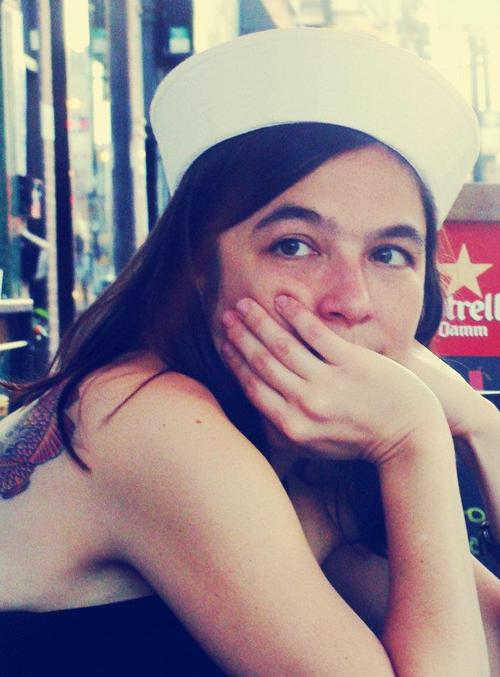
For those of you who aren’t already aware, Action, Yes is the online journal wing of Action Books, a pugnacious press operated by Johannes Göransson and Joyelle McSweeney, who happens to be the reigning brunette bombshell of 21st-century poetry.
Also, Action Books has published one of the most outrageous collections of poetry ever — a collection that manipulates language to enchanting extremes. This bold book is entitled Maxium Gaga. Its author is Lara Glenum.
Back to this edition of Action, Yes… it has many notable participants. I’m going to supply some of them with outfits.
First, I’ll dress the editors, Carina Finn and Jiyoon Lee.
An Interview with Tim Roberts, Co-Founder of Counterpath in Denver
I’ve been thinking a lot over the last year about how to nurture innovative writing communities and build structures to support those communities in places where they don’t exist, or where the existing structures are rickety or shoddy. About ways to create horizontal networks of writers interested in dialogue and exchange about art and writing outside of a university context. Maybe it’s because I’ve spent too many hours at readings with authors aiming for the NYC big leagues and elbowing each other for position. Too many evenings listening to the same “good story” or “good poem” lectures. Disappointed and often frustrated by the lack of innovative lit/art endeavors outside of a handful of big cities (and smaller centers), I’ve been looking for models for building innovative / small press / interdisciplinary writing communities in all the places we live.
As I set out to look for different examples, one kept coming up: Tim Roberts and Julie Carr’s work to build Counterpath in Denver, Colorado. Counterpath combines so many things: a press, a bookstore, a gallery, a performance space; their focus on the work of writers and artists who are driven to make “linguistic and visual interventions in contemporary global culture” seems spot-on. I am particularly drawn to Counterpath because their definition of what is “new” seems broad and because they are explicitly interested in work from groups often under-recognized in the experimental literary universe: people of color, women, queers. And their list of readings and events made me oh-so-excited: CA Conrad, Rodrigo Toscano, giovanni singleton, Lisa Robertson, Eleni Sikelianos. They’ve collaborated on events with Ugly Duckling Presse and Coffee House Press. I wondered how they did it all, how it all started and wanted to see if there was something I could learn from their experiences. Of course, being in the experimental hotbed of the Denver/Boulder area makes their job a bit easier, but I still wondered how they’d done it. There’s a great interview by Noah Eli Gordon with Julie Carr on the Volta that addresses some of these questions, but I still had more questions when I finished reading it.
So I sent Tim Roberts at Counterpath an email to see if he could give more details about the kind of work they’re doing. This interview is the result. Enjoy.
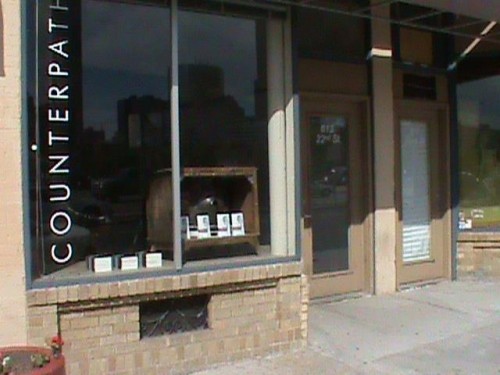 JP: How did you and Julie Carr begin Counterpath? Why and when? Was it originally a press or a space or a bookstore? Which came first? How did the other pieces develop over time?
JP: How did you and Julie Carr begin Counterpath? Why and when? Was it originally a press or a space or a bookstore? Which came first? How did the other pieces develop over time?
TR: We were living in Oakland, CA, when we started the press, in January of 2006. Julie was finishing a Ph.D. in English at UC Berkeley and I was working in book production at Stanford University Press. Both of us were doing a lot of writing, and then at that point I thought I could deal with most of what was necessary in terms of making the books, including design. The press project itself kind of just came to us and seemed like a natural progression of what we were already doing. We thought it might be useful in two distinct ways, in that it was a project grounded in a broad concept of writing itself, picking up from writers like Blanchot—not necessarily connected to a book, or ink on paper—and that responded to a sense of I guess political hopelessness when the US actually re-elected George W. Bush in 2004.
New York Tyrant Vol. IV Num. I
Better get this now; they always sell out fast and this will be no exception. One of the few magazines I still read cover to cover, maybe the only one. This issue is special-edited by Luke Goebel.
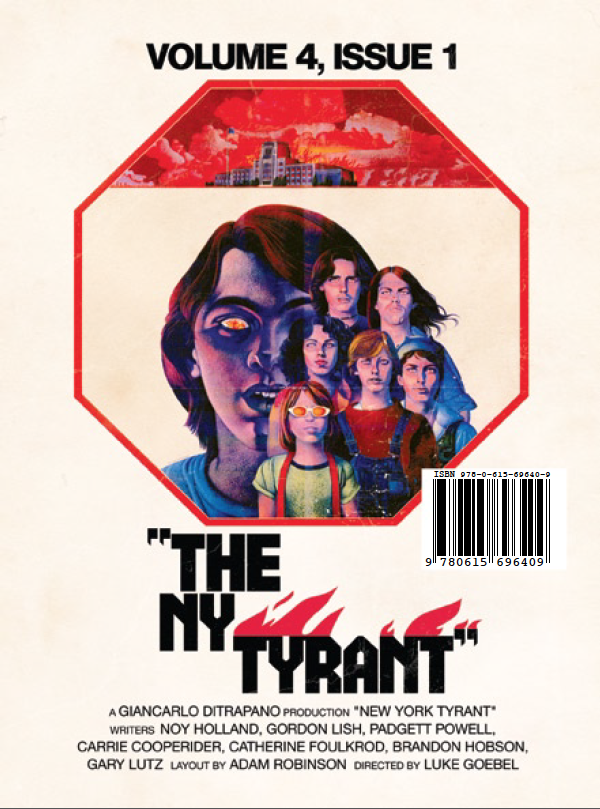
PAULA BOMER, HOB BROUN, CARRIE COOPERIDER, PUEHLE DIEBSONOVICH, CATHERINE FOULKROD, SUSAN FRODERBERG, RACHEL B. GLASER, BRANDON HOBSON, NOY HOLLAND, MARK LEIDNER, TAO LIN, GORDON LISH, ROBERT LOPEZ, GARY LUTZ, DAVID McLENDON, PADGETT POWELL, COOPER RENNER, PAMELA RYDER, AMBER SPARKS, JOSIAH SUMMERVILLE, J.A. TYLER, SAM VIRZI, ZACK WENTZ, COREY ZELLER.

